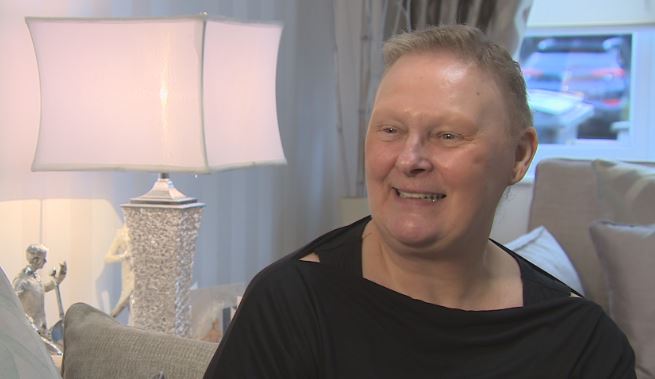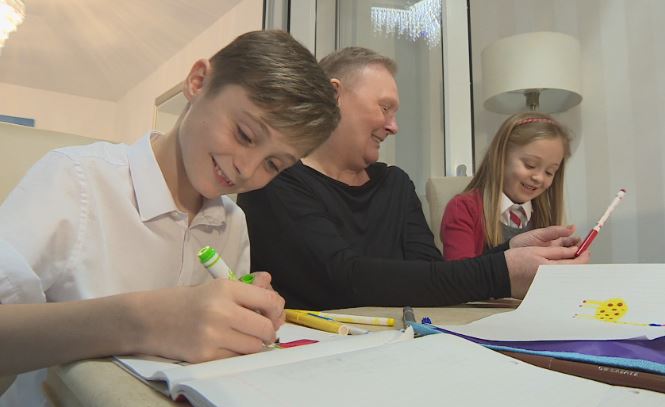A grandmother who refused to leave hospital until she was told what was wrong with her has experienced the “devastating consequences” caused by delays to cancer treatment.
Mary Carmichael was misdiagnosed with pleurisy but after suffering weeks of pain she returned to demand tests to work out what the cause was.
Eventually she was told she had stage four metastatic breast cancer but, at first, Mrs Carmichael did not realise this meant it was terminal.
“Everybody’s going to die we all know that, but the only thing is you’ve got a wee time bomb,” she told STV News.
 STV News
STV News“Not that you think about it, I don’t. I think about having a lovely Christmas, spending time with the children, going on holidays.”
The 61-year-old shared her story as NHS Scotland once again failed to meet a key waiting times standard for treatment with warnings of a “cancer catastrophe”.
A total of 83.1% of patients began their treatment within 62 days of being referred in the period of July to September 2021 – down from 84.1% in the previous three months and the 87.1% recorded in July to September 2020.
Mrs Carmichael’s cancer will kill her but chemotherapy at the Beatson in Glasgow has helped stop it from growing – keeping her alive to enjoy more time with the ones she loves.
“When you’re sitting with the counsellor you can sit and talk about your fears and be more honest than you would with your family.”
Mary Carmichael
Although her chemo continued through the coronavirus lockdown, the pandemic meant she had to shield away from family – she said this was one of the hardest things she has ever had to do.
Cancer charities are urging the Scottish Government to consider the mental health of patients when tackling waiting times.
They have warned of the serious impact a diagnosis can have, not only on an individual, but also their family, like Mrs Carmichael’s husband David and daughter Laura.
Cancer Support Scotland provided more than 6500 counselling appointments to those affected by cancer last year.
Mrs Carmichael said the services was a “lifeline” during lockdown – a time when she needed it most.
“I’ve got a beautiful family and friends who are there for me any time,” she said.
“It was just different having someone there that didn’t know you that you could speak to rather than upsetting David and Laura.
“When you’re sitting with the counsellor you can sit and talk about your fears and be more honest than you would with your family.”
The sessions helped the Bishopbriggs grandmother and her immediate family come to terms with her terminal diagnosis and the distance caused by being told to shield from loved ones.
Amid fears of extreme demand on the NHS during winter and the emergence of the Omicron Covid-19 variant, Cancer Support Scotland expects the burden on their wellbeing services to increase.
“Already we are hearing from patients who have experienced delays to diagnosis and treatment,” the charity’s chief executive Rob Murray told STV News.
“This is an unacceptable situation. As Mary Carmichael’s story shows, any delays can have devastating consequences for cancer patients.”
Mr Murray said the charity had been able to step in and provide vital services and support when the National Health Service faced huge pressure.
He said cancer does not only impact a person’s physical wellbeing and understanding how it affects someone’s mental health can help change their outlook and their life.
“We need a detailed plan, and more financial support, from the Scottish Government to ensure that every cancer patient across Scotland gets the mental health and wellbeing support they need,” he said.
Cancer Research said swift action was needed from government and NHS leaders to prevent a cancer catastrophe.
Responding to the waiting time statistics, a Scottish Government spokesperson said: “These figures show that more patients were treated within the 62-day standard following an urgent suspicion of cancer referral, compared to the same period pre-Covid.
“Although there are still challenges, we recently published the Framework for Effective Cancer Management, providing NHS Cancer Teams with the tools to effectively manage patients with a suspicion of cancer, from the point of referral to first treatment. This will improve both patient experience and cancer waiting times.
“The Endoscopy and Urology Diagnostic Recovery and Renewal Plan, backed by £70m investment, was published last month to address challenges in cancer pathways with scope-based diagnostic tests.
“Our national screening programmes are offering routine screening, however capacity is challenged due to the sustained pressure that the NHS remains under as a result of the pandemic. We will ensure care continues to be delivered safely to patients, based on their clinical priority.”
Follow STV News on WhatsApp
Scan the QR code on your mobile device for all the latest news from around the country





























